Fleurs du Mal Magazine


Or see the index
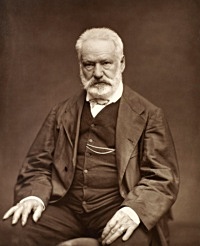
Il fait froid
L’hiver blanchit le dur chemin
Tes jours aux méchants sont en proie.
La bise mord ta douce main ;
La haine souffle sur ta joie.
La neige emplit le noir sillon.
La lumière est diminuée…
Ferme ta porte à l’aquilon !
Ferme ta vitre à la nuée !
Et puis laisse ton coeur ouvert !
Le coeur, c’est la sainte fenêtre.
Le soleil de brume est couvert ;
Mais Dieu va rayonner peut-être !
Doute du bonheur, fruit mortel ;
Doute de l’homme plein d’envie ;
Doute du prêtre et de l’autel ;
Mais crois à l’amour, ô ma vie !
Crois à l’amour, toujours entier,
Toujours brillant sous tous les voiles !
A l’amour, tison du foyer !
A l’amour, rayon des étoiles !
Aime, et ne désespère pas.
Dans ton âme, où parfois je passe,
Où mes vers chuchotent tout bas,
Laisse chaque chose à sa place.
La fidélité sans ennui,
La paix des vertus élevées,
Et l’indulgence pour autrui,
Eponge des fautes lavées.
Dans ta pensée où tout est beau,
Que rien ne tombe ou ne recule.
Fais de ton amour ton flambeau.
On s’éclaire de ce qui brûle.
A ces démons d’inimitié
Oppose ta douceur sereine,
Et reverse leur en pitié
Tout ce qu’ils t’ont vomi de haine.
La haine, c’est l’hiver du coeur.
Plains-les ! mais garde ton courage.
Garde ton sourire vainqueur ;
Bel arc-en-ciel, sors de l’orage !
Garde ton amour éternel.
L’hiver, l’astre éteint-il sa flamme ?
Dieu ne retire rien du ciel ;
Ne retire rien de ton âme !
Victor Hugo
(1802-1885)
Il fait froid
(Poème)
• fleursdumal.nl magazine
More in: Archive G-H, Archive G-H, Hugo, Victor, Victor Hugo
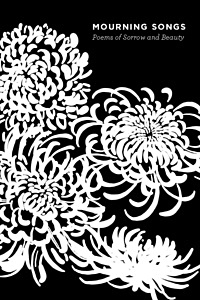 Who has not suffered grief?
Who has not suffered grief?
In Mourning Songs, the brilliant poet and editor Grace Schulman has gathered together the most moving poems about sorrow by the likes of Elizabeth Bishop, William Carlos Williams, Gwendolyn Brooks, Neruda, Catullus, Dylan Thomas, W. H. Auden, Shakespeare, Emily Dickinson, W. S. Merwin, Lorca, Denise Levertov, Keats, Hart Crane, Michael Palmer, Robert Frost, Hopkins, Hardy, Bei Dao, and Czeslaw Milosz—to name only some of the masters in this slim volume.
“The poems in this collection,” as Schulman notes in her introduction, “sing of grief as they praise life.” She notes: “As any bereaved survivor knows, there is no consolation. ‘Time doesn’t heal grief; it emphasizes it,’ wrote Marianne Moore.
The loss of a loved one never leaves us. We don’t want it to. In grief, one remembers the beloved. But running beside it, parallel to it, is the joy of existence, the love that causes pain of loss, the loss that enlarges us with the wonder of existence.”
Winner of the Poetry Society of America’s highest award, The Frost Medal, Grace Schulman is the author of seven poetry volumes as well as a book of essays and a new memoir, Strange Paradise: Portrait of a Marriage, about her life with her beloved late husband Jerome. She is a Distinguished Professor of English at Baruch College, CUNY, the former director of the Poetry Center, 92nd Street Y, and was for thirty-five years the poetry editor of The Nation.
Mourning Songs
Poems of sorrow and Beauty
Edited by Grace Schulman
Paperback
96 pages
Publisher: New Directions
Language: English
ISBN-10: 0811228665
ISBN-13: 978-0811228664
Product Dimensions: 4 x 6 inches
Price US 11.95
1 edition: May 28, 2019
# new books
Mourning Songs
Poetry
• fleursdumal.nl magazine
More in: - Book News, Archive S-T, Archive S-T, Art & Literature News, Danse Macabre
De herinnering aan de grote brand emotioneert hem. Hij merkt dat zijn hoofd gaat dazen, of er bijen in rond zoemen. Het zijn geen bijen, maar kinderstemmen. De school is uit.
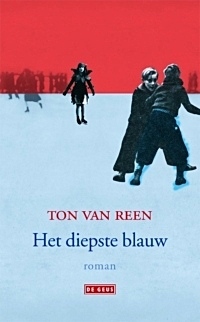 `Zit je hier al lang, opa?’ Het zijn Afke en Zhia. In hun kleurige jurken hinkelen ze rond zijn rolstoel.
`Zit je hier al lang, opa?’ Het zijn Afke en Zhia. In hun kleurige jurken hinkelen ze rond zijn rolstoel.
`Ik wachtte op jullie.’
`Wat gaan we doen?’
`Naar de watermolen?’
`Goed’, zegt Afke.
`Is er feest?’
`Hoezo?’
`Omdat jullie jurken dragen. Jullie lopen altijd in broeken.’
`Straks ga ik bij haar thuis spelen’, zegt Afke. `Zhia’s oma is over. Ze is heel aardig, maar tegen meisjes in broeken praat ze niet.’
`Ik vind die jurken ook veel mooier.’ Hij meent het echt.
Als vlinders lopen ze voor hem uit.
Bij het vlondertje van het voormalige huis van grootvader Rudolf staan ze even stil. Omdat ze daar altijd even stilstaan en omdat Mels er altijd wat vertelt.
`Hier legde ik vroeger mijn boot vast’, zegt hij. `Dan liep ik naar binnen. Grootvader vertelde vaak over zijn denkbeeldige reizen, of over de oorlog. In het schuurtje had hij een klein museum.’
`Waar is dat spul gebleven?’ vraagt Afke.
`Het meeste ligt bij mij op zolder.’
`Mogen wij er gaan kijken?’
`Zeker. Het spul moet er trouwens weg. Misschien is het iets voor een echt museum.’
`En als we het zelf willen houden?’ zegt Afke. `Je kunt het aan mij geven. Ik bewaar het goed.’
`Dan mag jij alles hebben.’
De meisjes hinkelen voor hem uit. Als ze te ver voorop zijn, wachten ze op hem.
`Ik wil het weitje bij mijn grootvaders huis wel weer eens zien’, zegt Mels.
`Wij spelen daar vaak’, zegt Afke.
`Vroeger kwam er nooit iemand. Alleen wij. Tijger heeft er een kist met spullen begraven. Voor later.’
`Wat zat erin?’
`Zijn cadeaus van een verjaardagsfeestje. Ook de mondharmonica die ik hem had gegeven.’
`Die is allang verroest’, zegt Zhia. `Waarom heeft hij dat spul begraven?’
`Tijger was net een eekhoorn. Hij stopte de dingen waarvan hij hield weg.’
`Eekhoorns vergeten waar ze hun noten begraven hebben’, zegt Zhia.
`Tijger kreeg niet eens de tijd om zijn spullen terug te zoeken.’
Bij de brug slaat hij de weg in die langs de Wijer naar de molen en de parkeerplaats loopt.
`Jij rijdt hard’, roept Afke tegen hem. `Straks rij je het water in.’
`Passen júllie maar op. Er zitten duiveltjes in het water, die je met hun haakstokken de beek in trekken.’
Hij stopt omdat hij een dode kraai aan de kant ziet liggen. Verderop ligt een dode egel. Vroeger stonden hier de frambozen van zijn moeder. De dieren hadden er vrij spel, maar op het asfalt hebben ze geen kans. De vogels en dieren die vroeger te snel of te stekelig waren om ze te kunnen pakken, zijn nu te langzaam of te zacht om te ontsnappen aan de auto’s van de mensen die de molen bezoeken.
Ton van Reen: Het diepste blauw (096)
wordt vervolgd
• fleursdumal.nl magazine
More in: - Book News, - Het diepste blauw, Archive Q-R, Reen, Ton van
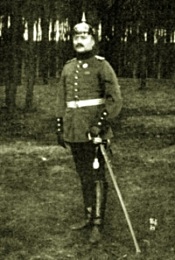
Tanz
Milchweiche Schultern!
Augen flirren, flackern!
Blond und schwarz und sonnengolden
Taumeln Haare, wirren, krampfen,
Schlingen Brücken,
Brücken!
Hin
Und rüber
Taumeln, Kitzel,
Bäumen, saugen,
Saugen, züngeln
Schürfen
Blut
Schweres, lustgesträubtes
Blut!
In die Wunden
Hüpfen Töne,
Sielen, bohren,
Wühlen, quirlen,
Fallen kichernd,
Schwellen auf und fressen sich,
Gatten, gatten, schwängern sich,
Bären Schauer
Wahnengroß!
Hilflos surren um die Lichter
Mutterängste
Nach den Kindern,
Die sich winden,
Winden, huschen
Vor den Tritten,
Die sie packen,
Ihre glasen, sichten Leiber
Schinden, scharren,
Pressen, schleudern,
Tückisch abgemessne Lüste
Jagen unter Brunstgestöne,
Brunstgeächze
Und
Gekrächze!
Durch die Wirrnis
Durch die Flirrnis
Blitzt Verstummen!
Jäh zerflattern
Drängen gellend
An die Decke
Sich die Töne,
Klammern, krallen
Scheu verwimmernd
Am Gebälk!
Glotzen nieder,
Wo mit Wuchten
Schlorrt das Keuchen,
Schlappet
Ringsum an den Wänden
Seinen ungefügen Leib,
Unzahlmäulig
zuckt und schnauft!
An die angstzerglühten Herzen
Reißen flammend hoch die Lichter
Ihre hetzverstörten Kinder,
Die in Irren, Wirren
Zitternd
Ob der ungewohnten Ruhe
Ab sich tasten
Und sich streicheln
Gegenseitig
Hell von Staunen,
Daß sie leben noch,
Sie leben!
Zagig finden sie das Lächeln,
Fluten leise, fluten, fluten,
Reichen summend sich die Hände,
werden warm
Und
Schwingen Reigen!
Da
In Peitschlust, Streitdurst, Quälsucht
Vollgesogen
Vom Gebälke
Stiebt das Gellen!
Schrillt unbändig,
Ueberschlägt sich,
Purzelt, flattert,
Springt und stöbert,
Federt, pumpelt auf
Das Untier,
Das
Mit tausend Füßen aufschrickt,
Trippelt, trappelt,
Trappelt, grappelt,
Gell gedrängelt
Von den Tönen,
Die zerrasseln,
Niederprasseln,
Peitschen, schlagen, fiebern, kosen
Und im Wirbel
Wringen, wiegen
Schwelles,
Blaßhellrotes Fleisch!
Milchweiche Schultern!
Augen . . .
August Stramm
(1874-1915)
Tanz, 1914
• fleursdumal.nl magazine
More in: *War Poetry Archive, Archive S-T, Expressionism, Stramm, August
A poet and anthropologist explores the surprising world of war games in mock Middle Eastern villages in which the U.S. military trains.
 With deft lyrical attention, these documentary poems reveal the nuanced culture and violence of the war machine—alive and well within these basecamp villages, the American military, and, ultimately, the human heart.
With deft lyrical attention, these documentary poems reveal the nuanced culture and violence of the war machine—alive and well within these basecamp villages, the American military, and, ultimately, the human heart.
Kill Class is based on Nomi Stone’s two years of fieldwork in mock Middle Eastern villages at military bases across the United States.
The speaker in these poems, an anthropologist, both witnesses and participates in combat training exercises staged at “Pineland,” a simulated country in the woods of the American South, where actors of Middle Eastern origin are hired to theatricalize war, repetitively pretending to bargain and mourn and die.
Kill Class is an arresting ethnography of American military culture, one that allows readers to circle at length through the cloverleaf interchanges where warfare nestles into even the most mundane corners of everyday life.
Nomi Stone is a poet, anthropologist, and author of a previous book of poems, Stranger’s Notebook (TriQuarterly, 2008). Winner of a 2018 Pushcart Prize, Stone’s poems appear recently in POETRY Magazine, American Poetry Review, The Best American Poetry, The New Republic, Tin House, New England Review, and elsewhere. Stone has a PhD in Cultural Anthropology from Columbia University, an MPhil in Middle East Studies from Oxford, and an MFA in Poetry from Warren Wilson College. She teaches at Princeton University and her ethnography in progress, Human Technology and American War, is a finalist for the University of California Press Atelier Series.
Kill Class
by Nomi Stone (Author)
Paperback
87 pages
Publisher: Tupelo Press
February 1, 2019
Language: English
Poetry
ISBN-10: 1946482196
ISBN-13: 978-1946482198
$17.95
# new poetry
Kill Class
by Nomi Stone
• fleursdumal.nl magazine
More in: *War Poetry Archive, - Book News, - Book Stories, Archive S-T, Archive S-T, Art & Literature News, WAR & PEACE
In Zebra, a boy steps tentatively from the shadows onto a strobe-lit dancefloor.
 Ian Humphreys’ much-anticipated debut shimmers with music, wit and humour while exploring mixed identities, otherness, and coming-of-age as a gay man in 1980s Manchester.
Ian Humphreys’ much-anticipated debut shimmers with music, wit and humour while exploring mixed identities, otherness, and coming-of-age as a gay man in 1980s Manchester.
These acutely-observed, joyful poems pay homage to those who took the first steps – minority writers, LGBT civil rights activists, 70s queer night-clubbers and the poet’s own mixed-race parents.
A heady cocktail of the playful, political and mythical, Humphreys’ Zebra is also a creature of opposites – light and dark, countryside and cityscape, highs and lows. The collection moves from semi-rural England to the metropolitan hubs of Hong Kong, London and New York, circling its subjects, often finding the uncanny in the familiar, always drawing the reader centre-stage.
Ian’s debut full-length collection of poetry, Zebra, is forthcoming from Nine Arches Press in Spring, 2019. A portfolio of his poems was published in 2017 by Bloodaxe in Ten: Poets of the New Generation. His work has featured in magazines and anthologies, such as The Poetry Review, The Rialto, Ambit, Magma and The Forward Book of Poetry.
Ian Humphreys has won a number of awards, including first prize in both the 2016 Hamish Canham Prize and the 2013 PENfro Open Poetry Competition. In 2018, he was Highly Commended in the Forward Prizes for Poetry. Ian has also been published internationally in overseas journals and anthologies. His fiction has been shortlisted three times for the Bridport Prize.
Ian Humphreys has had work featured in journals and anthologies such as The Poetry Review, The Rialto, Magma and The Forward Book of Poetry 2019. Awards include first prize in the Poetry Society’s Hamish Canham Prize. He has been highly commended in the Forward Prizes for Poetry, and two of his poems have been longlisted in the National Poetry Competition. Ian is a fellow of The Complete Works, which promotes diversity, quality and innovation in British poetry. A portfolio of his poems is published in Ten: Poets of the New Generation (Bloodaxe).
Zebra
Ian Humphreys
Poetry
Format Paperback
80 pages
Dimensions 150 x 210 x 22mm
Publication date 11 Apr 2019
Publisher Nine Arches Press
Publication City/Country Rugby, United Kingdom
Language English
ISBN10 1911027700
ISBN13 9781911027706
Cover artwork: Louise Crosby
BIC Code: DCF
€15,99
# new poetry
Ian Humphreys
Zebra
• fleursdumal.nl magazine
More in: - Book News, - Book Stories, Archive G-H, Archive G-H, Art & Literature News, Riding a Zebra
Luigi Pirandello’s extraordinary final novel begins when Vitangelo Moscarda’s wife remarks that Vitangelo’s nose tilts to the right.
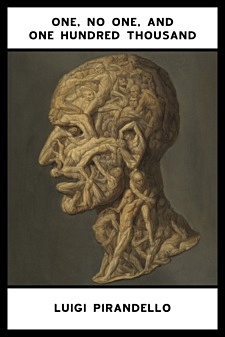 This commonplace interaction spurs the novel’s unemployed, wealthy narrator to examine himself, the way he perceives others, and the ways that others perceive him.
This commonplace interaction spurs the novel’s unemployed, wealthy narrator to examine himself, the way he perceives others, and the ways that others perceive him.
At first he only notices small differences in how he sees himself and how others do; but his self-examination quickly becomes relentless, dizzying, leading to often darkly comic results as Vitangelo decides that he must demolish that version of himself that others see.
Pirandello said of his 1926 novel that it “deals with the disintegration of the personality. It arrives at the most extreme conclusions, the farthest consequences.” Indeed, its unnerving humor and existential dissection of modern identity find counterparts in Samuel Beckett’s Molloy trilogy and the works of Thomas Bernhard and Vladimir Nabokov.
Luigi Pirandello (1867-1936) was an Italian author, who was awarded the Nobel Prize for Literature in 1934 for his “bold and brilliant renovation of the drama and the stage.” Pirandello’s works include novels, hundreds of short stories, and plays. Pirandello’s plays are often seen as forerunners for the theatre of the absurd.
One, No One, and One Hundred Thousand
Luigi Pirandello
Translated by William Weaver
Publisher Spurl Editions
Format Paperback
218 pages
ISBN-10 194367907X
ISBN-13 9781943679072
2018
$18.00
# new books
Title One, No One, and One Hundred Thousand
Author Luigi Pirandello
Translated by William Weaver
• fleursdumal.nl magazine
More in: - Book News, - Book Stories, Archive O-P, Archive O-P, Luigi Pirandello, Pirandello, Luigi, Pirandello, Luigi, Samuel Beckett, Thomas Bernhard, Vladimir Nabokov
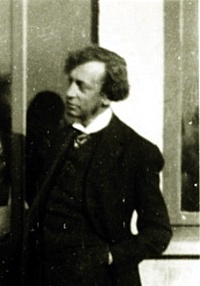
De meiskens uit de taveernen
De meiskens uit de taveernen,
Zij hebben een malsen schoot.
Zij zien er de jongens geerne.
Zij baren haar kindren dood.
Zij dragen van vurige zijde
een keursken dat spant en splijt.
We ontwaken aan haar zijde
met den houten mond van de spijt.
De ronde zee waar wij zwalken,
die eindeloos wenkt en geeuwt,
en ons doet van begeren balken,
en ons verre vrouwe verweêwt:
wij ankren in de taveernen
waar geniepig een rust ons smijt.
Daar wachten ons rood de deernen.
Daar raken wij ‘t leven kwijt.
Karel van de Woestijne
(1878 – 1929)
De meiskens uit de taveernen
• fleursdumal.nl magazine
More in: Archive W-X, Archive W-X, Woestijne, Karel van de
Bejan Matur behoort tot de bekendste en bij literatuurliefhebbers meest gewaardeerde dichters in Turkije.
Bij de politieke overheid van haar land ligt dat anders. Maar ze heeft intussen internationale faam opgebouwd en leeft in wisselende landen in Europa. In 2002 trad ze op tijdens Poetry International in Rotterdam.
 Bejan Matur
Bejan Matur
Ceremoniële gewaden
Gedichten
Uitgever Kleinood & Grootzeer
Bundel
54 pagina’s
gelijmd
21 x 10,5 cm
ISBN/EAN 978-90-76644-89-9
€18,-
Eerste druk 100 genummerde door de auteur en de vertaler gesigneerde exemplaren
Vertaling en nawoord Willem M. Roggeman
Bejan Matur
Bejan Matur behoort tot de bekendste en bij literatuur-liefhebbers meest gewaardeerde dichters in Turkije. Bij de politieke overheid van haar land ligt dat anders. Maar zij heeft intussen ook een internationale faam opgebouwd. Haar poëzie werd in verscheidene talen vertaald en zelf wordt zij geregeld gevraagd als gast op internationale poëziefestivals. Zij publiceerde tot nog toe in Turkije tien werken, negen dichtbundels en een prozaboek dat als literaire journalistiek kan bestempeld worden.
 Dit boek, Dagin Ardina Bakmak (Kijken achter de berg), handelt over de Koerdische kwestie en verscheen in februari 2011. Er heerste toen in Turkije een nog rustige periode waarin er een vredesproces aan de gang was. Bejan Matur besloot over de PKK-guerilleros te schrijven. Zij trok hiervoor naar het gebied waar de Koerdische vrijheidsstrijders zich schuilhielden en zij had meerdere gesprekken met hen. Deze gesprekken dienden als basis voor dit nog steeds actuele boek over een volk zonder land. Dit boek werd onmiddellijk een bestseller. Er werden meer dan 50.000 exemplaren van verkocht en nadien werden er nog verscheidene clandestiene uitgaven van gemaakt.
Dit boek, Dagin Ardina Bakmak (Kijken achter de berg), handelt over de Koerdische kwestie en verscheen in februari 2011. Er heerste toen in Turkije een nog rustige periode waarin er een vredesproces aan de gang was. Bejan Matur besloot over de PKK-guerilleros te schrijven. Zij trok hiervoor naar het gebied waar de Koerdische vrijheidsstrijders zich schuilhielden en zij had meerdere gesprekken met hen. Deze gesprekken dienden als basis voor dit nog steeds actuele boek over een volk zonder land. Dit boek werd onmiddellijk een bestseller. Er werden meer dan 50.000 exemplaren van verkocht en nadien werden er nog verscheidene clandestiene uitgaven van gemaakt.
Maar sedert het vredesproces door de Turkse overheid werd opgeblazen kreeg Bejan Matur het bijzonder moeilijk, vooral omwille van deze reportage. Zij werd zelfs opgesloten in de gevangenis en werd er gefolterd om haar bronnen prijs te geven. In 2016 besloot zij dan ook het land te verlaten omdat zij zich bedreigd voelde bij al wat zij schreef. Niet alleen was er de mogelijkheid van een proces, maar er werden ook doodsbedreigingen geuit. Zij koos dan ook voor een vrijwillige ballingschap in Londen. Maar zij miste daar de mediterrane levenswijze. Daarom keerde zij in oktober 2017 toch terug naar Istanbul. Sedertdien verdeelt zij haar tijd tussen Istanbul, Londen, Athene en Verona.
Bejan Matur werd op 14 september 1968 geboren in een Koerdisch-Alevisch gezin in de oude Hitietenstad Kahramanmarash in het zuidoosten van Turkije, Koerdisch gebied. Zij studeerde aan het lyceum in de grotere stad Gaziantep en leefde toen samen met haar zusters ver van haar ouders. Haar vader wenste dat zij advocaat zou worden, of anders journalist.
Aan de universiteit van Ankara studeerde zij rechten, maar zij heeft nooit een advocatenpraktijk uitgeoefend. Zij werd diep getroffen door de onrechtvaardige behandeling van de Koerden en andere etnische minderheden in Turkije, wat steeds gebeurde onder het mom van de toepassing van de wet. Ook kwam zij tot de conclusie dat zij als advocaat alleen zou kunnen optreden als verdediger van de mensenrechten, maar dat zij hiervoor over weinig juridische mogelijkheden beschikte.
Al tientallen jaren heerst er een gewapend conflict tussen de Turkse staat en diverse Koerdische opstandige groeperingen. De Koerden verklaren dat zij vrijheidsstrijders zijn tegen de vreemde bezetters van hun land terwijl de Turkse staat hen bestempeld als terroristen en separatisten. Zelf was Bejan Matur tien jaar toen zij in 1978 getuige was van een pogrom op de Alevis in haar geboortestad. De vraag “Waarom doden zij ons?” heeft deze dichteres sedertdien nooit meer verlaten. Dit werd de beladen thematiek van de poëzie van Bejan Matur. In haar gedichten is vaak sprake van pijn, bloed en leed. Gelukkig laat ze zich nooit verleiden tot het schrijven van politiek geëngageerde gedichten, wat haar poëzie immers tijdgebonden en al gauw verouderd zou maken. Bovendien verafschuwt zij de slachtofferrol en streeft zij daarom eerder naar het scheppen van een ruimte om te dromen, een ruimte voor de artistieke creatie, voor hoop en liefde.
Hoewel zij nooit advocaat werd, brengt Bejan Matur als auteur, zowel in haar gedichten als in artikelen, toch een pleidooi voor de mensenrechten in het algemeen, maar ook voor de rechten van de vrouw en de bescherming van andere bedreigde groepen in de samenleving. Reeds tijdens haar studies publiceerde zij poëzie in diverse tijdschriften. Haar gedichten werden toen als “duister en mystiek” bestempeld. Zij schrijft haar gedichten in het Turks, maar de gevoelswaarde en het ritme van de Koerdische taal zijn erin te herkennen.
Vaak wordt god genoemd in deze gedichten, maar steeds volledig met kleine letters geschreven. Men moet de naam god dan ook niet zo zeer lezen in religieuze zin, maar eerder als een zinnebeeld voor het menselijk hart dat verlangt naar vrede, vrijheid en liefde voor de medemens. Dit wordt vooral duidelijk in het gedicht “Ceremoniële gewaden” waar zij schrijft: Misschien is geschiedenis een vergissing, zegt de dichter. De mens zelf is een vergissing, zegt god.
Haar eerste dichtbundel Rüzgar Dolu Konaklar (De wind huilt tussen de herenhuizen) verscheen in 1996 en stond volledig buiten de heersende trend in de Turkse poëzie. Deze sjamanistische poëzie met haar heidense beelden hoorde eerder bij het verleden dan bij het heden. Precies hierdoor trok hij sterk de aandacht. Voor deze bundel kreeg Bejan Matur zelfs verscheidene prijzen.
Haar tweede bundel, Tanri Görmesin Harflerini (God moet mijn handgeschreven brief niet zien) verscheen in 1999 en werd eveneens gunstig onthaald. In 2002 verschenen tegelijkertijd twee bundels, Ayin Büyüttügü Ogüllar (Zonen opgevoed door de maan) en Onün çölünde (In zijn woestijn).
De poëzie van Bejan Matur werd reeds in meer dan twintig talen vertaald, maar er verscheen nauwelijks iets in het Nederlands. Wel trad zij in juni 2002 op tijdens het internationaal poëziefestival Poetry International in Rotterdam. Naar aanleiding hiervan verschenen twee gedichten in Nederlandse vertaling door Ireneus Spit in de bloemlezing “Hotel Parnassus”, uitgegeven door De Arbeiderspers in Amsterdam.
In Engeland verscheen in 2003 de bundel In the Temple of a Patient God en bij de uitgeverij Phi in Luxemburg verscheen een Duitse en een Franse bundel.
Bejan Matur wordt geregeld gevraagd om op te treden in het buitenland. Zo leerde ik haar persoonlijk kennen op het internationaal poëziefestival dat in september 2008 in Tel Aviv werd gehouden.
Haar vijfde dichtbundel Ibrahim’in Beni Terketmesi (Abraham verlaat ons) verscheen in maart 2008 en werd door de critici ontvangen als haar voorlopig beste werk. De beeldvorming in dit werk werd ook weer als mystiek beschreven. De dichteres heeft inderdaad een persoonlijke ontologie gecreëerd, die steunt op de Soefi-traditie, die meer dan duizend jaar oud is. In 2009 verscheen Dogunun Kapisi: Diyarbakir (De Poort van het Oosten: Diyarbakir) en een jaar later publiceerde Bejan Matur Kader Denizi (Zee van Geloof), gedichten bij foto’s van Mehmet Günyeli. Deze foto’s waren eerder te zien op tentoonstellingen in prestigieuze galerieën in Istanbul en Ankara.
Vanaf 2005 schreef Bejan Matur geregeld artikelen in het Turkse dagblad Zaman, maar in 2012 werd zij ontslagen. Zij werkte af en toe mee aan het Engelstalige dagblad Today’s Zaman. Zij schreef hoofdzakelijk artikelen over de situatie van de Koerden, maar ook over het problematisch bestaan van de Armeniërs, over actuele politieke gebeurtenissen, minderheidsgroepen, gevangenis-literatuur en de onderdrukking van de vrouw.
Thans werkt zij aan geen enkele krant meer mee.
In haar laatste twee bundels, Son Dag (De laatste berg, 2015) en Ask Olmayan (Liefdesgedichten, 2016) vindt men de typische Koerdische levenssfeer terug in de talrijke natuurbeschrijvingen en in de weergave van de landschappen van Koerdistan, binnen en buiten de grenzen van Turkije. De bergen, de rivieren, de maan, de zon en de plantengroei komen steeds weer in deze verzen voor en bepalen mee het ritme van haar zeggings-wijze, die echter vooral door de wind wordt gedragen. Het valt dan ook onmiddellijk op dat de wind als symbool een primaire rol speelt in deze gedichten. Met haar talrijke allusies op elementen uit de eeuwenoude Koerdische cultuur neemt Bejan Matur een unieke en heel aparte plaats in de hedendaagse Turkse poëzie in.
Willem M. Roggeman
11 maart 2019
Uitgeverij Kleinood & Grootzeer
Kon. Wilhelminastraat 46
4615 JB Bergen op Zoom NL
T: 0164 24 00 49 (0031 164 24 00 49)
email: uitgeverij@kleinood-en-grootzeer.com
website: http://kleinood-en-grootzeer.com/index.html
• fleursdumal.nl magazine
More in: #Editors Choice Archiv, - Book News, - Book Stories, Archive M-N, Archive M-N, Archive Q-R, Art & Literature News, REPRESSION OF WRITERS, JOURNALISTS & ARTISTS, TRANSLATION ARCHIVE
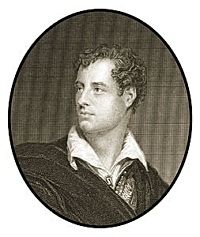
My Soul Is Dark
My soul is dark – Oh! quickly string
The harp I yet can brook to hear;
And let thy gentle fingers fling
Its melting murmurs o’er mine ear.
If in this heart a hope be dear,
That sound shall charm it forth again:
If in these eyes there lurk a tear,
‘Twill flow, and cease to burn my brain.
But bid the strain be wild and deep,
Nor let thy notes of joy be first:
I tell thee, minstrel, I must weep,
Or else this heavy heart will burst;
For it hath been by sorrow nursed,
And ached in sleepless silence, long;
And now ’tis doomed to know the worst,
And break at once – or yield to song.
George Gordon Byron
(1788 – 1824)
My Soul Is Dark
(Poem)
• fleursdumal.nl magazine
More in: Archive A-B, Archive A-B, Byron, Lord
OLD ABE’S CONVERSION
The Negro population of the little Southern town of Danvers was in a state of excitement such as it seldom reached except at revivals, baptisms, or on Emancipation Day. The cause of the commotion was the anticipated return of the Rev. Abram Dixon’s only son, Robert, who, having taken up his father’s life-work and graduated at one of the schools, had been called to a city church.
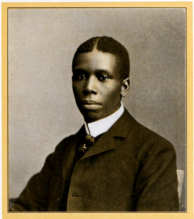 When Robert’s ambition to take a college course first became the subject of the village gossip, some said that it was an attempt to force Providence. If Robert were called to preach, they said, he would be endowed with the power from on high, and no intervention of the schools was necessary. Abram Dixon himself had at first rather leaned to this side of the case. He had expressed his firm belief in the theory that if you opened your mouth, the Lord would fill it. As for him, he had no thought of what he should say to his people when he rose to speak. He trusted to the inspiration of the moment, and dashed blindly into speech, coherent or otherwise.
When Robert’s ambition to take a college course first became the subject of the village gossip, some said that it was an attempt to force Providence. If Robert were called to preach, they said, he would be endowed with the power from on high, and no intervention of the schools was necessary. Abram Dixon himself had at first rather leaned to this side of the case. He had expressed his firm belief in the theory that if you opened your mouth, the Lord would fill it. As for him, he had no thought of what he should say to his people when he rose to speak. He trusted to the inspiration of the moment, and dashed blindly into speech, coherent or otherwise.
Himself a plantation exhorter of the ancient type, he had known no school except the fields where he had ploughed and sowed, the woods and the overhanging sky. He had sat under no teacher except the birds and the trees and the winds of heaven. If he did not fail utterly, if his labour was not without fruit, it was because he lived close to nature, and so, near to nature’s God. With him religion was a matter of emotion, and he relied for his results more upon a command of feeling than upon an appeal to reason. So it was not strange that he should look upon his son’s determination to learn to be a preacher as unjustified by the real demands of the ministry.
But as the boy had a will of his own and his father a boundless pride in him, the day came when, despite wagging heads, Robert Dixon went away to be enrolled among the students of a growing college. Since then six years had passed. Robert had spent his school vacations in teaching; and now, for the first time, he was coming home, a full-fledged minister of the gospel.
It was rather a shock to the old man’s sensibilities that his son’s congregation should give him a vacation, and that the young minister should accept; but he consented to regard it as of the new order of things, and was glad that he was to have his boy with him again, although he murmured to himself, as he read his son’s letter through his bone-bowed spectacles: “Vacation, vacation, an’ I wonder ef he reckons de devil’s goin’ to take one at de same time?”
It was a joyous meeting between father and son. The old man held his boy off and looked at him with proud eyes.
“Why, Robbie,” he said, “you—you’s a man!”
“That’s what I’m trying to be, father.” The young man’s voice was deep, and comported well with his fine chest and broad shoulders.
“You’s a bigger man den yo’ father ever was!” said his mother admiringly.
“Oh, well, father never had the advantage of playing football.”
The father turned on him aghast. “Playin’ football!” he exclaimed. “You don’t mean to tell me dat dey ‘lowed men learnin’ to be preachers to play sich games?”
“Oh, yes, they believe in a sound mind in a sound body, and one seems to be as necessary as the other in fighting evil.”
Abram Dixon shook his head solemnly. The world was turning upside down for him.
“Football!” he muttered, as they sat down to supper.
Robert was sorry that he had spoken of the game, because he saw that it grieved his father. He had come intending to avoid rather than to combat his parent’s prejudices. There was no condescension in his thought of them and their ways. They were different; that was all. He had learned new ways. They had retained the old. Even to himself he did not say, “But my way is the better one.”
His father was very full of eager curiosity as to his son’s conduct of his church, and the son was equally glad to talk of his work, for his whole soul was in it.
“We do a good deal in the way of charity work among the churchless and almost homeless city children; and, father, it would do your heart good if you could only see the little ones gathered together learning the first principles of decent living.”
“Mebbe so,” replied the father doubtfully, “but what you doin’ in de way of teachin’ dem to die decent?”
The son hesitated for a moment, and then he answered gently, “We think that one is the companion of the other, and that the best way to prepare them for the future is to keep them clean and good in the present.”
“Do you give ’em good strong doctern, er do you give ’em milk and water?”
“I try to tell them the truth as I see it and believe it. I try to hold up before them the right and the good and the clean and beautiful.”
“Humph!” exclaimed the old man, and a look of suspicion flashed across his dusky face. “I want you to preach fer me Sunday.”
It was as if he had said, “I have no faith in your style of preaching the gospel. I am going to put you to the test.”
Robert faltered. He knew his preaching would not please his father or his people, and he shrank from the ordeal. It seemed like setting them all at defiance and attempting to enforce his ideas over their own. Then a perception of his cowardice struck him, and he threw off the feeling that was possessing him. He looked up to find his father watching him keenly, and he remembered that he had not yet answered.
“I had not thought of preaching here,” he said, “but I will relieve you if you wish it.”
“De folks will want to hyeah you an’ see what you kin do,” pursued his father tactlessly. “You know dey was a lot of ’em dat said I oughn’t ha’ let you go away to school. I hope you’ll silence ’em.”
Robert thought of the opposition his father’s friends had shown to his ambitions, and his face grew hot at the memory. He felt his entire inability to please them now.
“I don’t know, father, that I can silence those who opposed my going away or even please those who didn’t, but I shall try to please One.”
It was now Thursday evening, and he had until Saturday night to prepare his sermon. He knew Danvers, and remembered what a chill fell on its congregations, white or black, when a preacher appeared before them with a manuscript or notes. So, out of concession to their prejudices, he decided not to write his sermon, but to go through it carefully and get it well in hand. His work was often interfered with by the frequent summons to see old friends who stayed long, not talking much, but looking at him with some awe and a good deal of contempt. His trial was a little sorer than he had expected, but he bore it all with the good-natured philosophy which his school life and work in a city had taught him.
The Sunday dawned, a beautiful, Southern summer morning; the lazy hum of the bees and the scent of wild honeysuckle were in the air; the Sabbath was full of the quiet and peace of God; and yet the congregation which filled the little chapel at Danvers came with restless and turbulent hearts, and their faces said plainly: “Rob Dixon, we have not come here to listen to God’s word. We have come here to put you on trial. Do you hear? On trial.”
And the thought, “On trial,” was ringing in the young minister’s mind as he rose to speak to them. His sermon was a very quiet, practical one; a sermon that sought to bring religion before them as a matter of every-day life. It was altogether different from the torrent of speech that usually flowed from that pulpit. The people grew restless under this spiritual reserve. They wanted something to sanction, something to shout for, and here was this man talking to them as simply and quietly as if he were not in church.
As Uncle Isham Jones said, “De man never fetched an amen”; and the people resented his ineffectiveness. Even Robert’s father sat with his head bowed in his hands, broken and ashamed of his son; and when, without a flourish, the preacher sat down, after talking twenty-two minutes by the clock, a shiver of surprise ran over the whole church. His father had never pounded the desk for less than an hour.
Disappointment, even disgust, was written on every face. The singing was spiritless, and as the people filed out of church and gathered in knots about the door, the old-time head-shaking was resumed, and the comments were many and unfavourable.
“Dat’s what his schoolin’ done fo’ him,” said one.
“It wasn’t nothin’ mo’n a lecter,” was another’s criticism.
“Put him ‘side o’ his father,” said one of the Rev. Abram Dixon’s loyal members, “and bless my soul, de ol’ man would preach all roun’ him, and he ain’t been to no college, neither!”
Robert and his father walked home in silence together. When they were in the house, the old man turned to his son and said:
“Is dat de way dey teach you to preach at college?”
“I followed my instructions as nearly as possible, father.”
“Well, Lawd he’p dey preachin’, den! Why, befo’ I’d ha’ been in dat pulpit five minutes, I’d ha’ had dem people moanin’ an’ hollerin’ all over de church.”
“And would they have lived any more cleanly the next day?”
The old man looked at his son sadly, and shook his head as at one of the unenlightened.
Robert did not preach in his father’s church again before his visit came to a close; but before going he said, “I want you to promise me you’ll come up and visit me, father. I want you to see the work I am trying to do. I don’t say that my way is best or that my work is a higher work, but I do want you to see that I am in earnest.”
“I ain’t doubtin’ you mean well, Robbie,” said his father, “but I guess I’d be a good deal out o’ place up thaih.”
“No, you wouldn’t, father. You come up and see me. Promise me.”
And the old man promised.
It was not, however, until nearly a year later that the Rev. Abram Dixon went up to visit his son’s church. Robert met him at the station, and took him to the little parsonage which the young clergyman’s people had provided for him. It was a very simple place, and an aged woman served the young man as cook and caretaker; but Abram Dixon was astonished at what seemed to him both vainglory and extravagance.
“Ain’t you livin’ kin’ o’ high fo’ yo’ raisin’, Robbie?” he asked.
The young man laughed. “If you’d see how some of the people live here, father, you’d hardly say so.”
Abram looked at the chintz-covered sofa and shook his head at its luxury, but Robert, on coming back after a brief absence, found his father sound asleep upon the comfortable lounge.
On the next day they went out together to see something of the city. By the habit of years, Abram Dixon was an early riser, and his son was like him; so they were abroad somewhat before business was astir in the town. They walked through the commercial portion and down along the wharves and levees. On every side the same sight assailed their eyes: black boys of all ages and sizes, the waifs and strays of the city, lay stretched here and there on the wharves or curled on doorsills, stealing what sleep they could before the relentless day should drive them forth to beg a pittance for subsistence.
“Such as these we try to get into our flock and do something for,” said Robert.
His father looked on sympathetically, and yet hardly with full understanding. There was poverty in his own little village, yes, even squalour, but he had never seen anything just like this. At home almost everyone found some open door, and rare was the wanderer who slept out-of-doors except from choice.
At nine o’clock they went to the police court, and the old minister saw many of his race appear as prisoners, receiving brief attention and long sentences. Finally a boy was arraigned for theft. He was a little, wobegone fellow hardly ten years of age. He was charged with stealing cakes from a bakery. The judge was about to deal with him as quickly as with the others, and Abram’s heart bled for the child, when he saw a negro call the judge’s attention. He turned to find that Robert had left his side. There was a whispered consultation, and then the old preacher heard with joy, “As this is his first offence and a trustworthy person comes forward to take charge of him, sentence upon the prisoner will be suspended.”
Robert came back to his father holding the boy by the hand, and together they made their way from the crowded room.
“I’m so glad! I’m so glad!” said the old man brokenly.
“We often have to do this. We try to save them from the first contact with the prison and all that it means. There is no reformatory for black boys here, and they may not go to the institutions for the white; so for the slightest offence they are sent to jail, where they are placed with the most hardened criminals. When released they are branded forever, and their course is usually downward.”
He spoke in a low voice, that what he said might not reach the ears of the little ragamuffin who trudged by his side.
Abram looked down on the child with a sympathetic heart.
“What made you steal dem cakes?” he asked kindly.
“I was hongry,” was the simple reply.
The old man said no more until he had reached the parsonage, and then when he saw how the little fellow ate and how tenderly his son ministered to him, he murmured to himself, “Feed my lambs”; and then turning to his son, he said, “Robbie, dey’s some’p’n in ‘dis, dey’s some’p’n in it, I tell you.”
That night there was a boy’s class in the lower room of Robert Dixon’s little church. Boys of all sorts and conditions were there, and Abram listened as his son told them the old, sweet stories in the simplest possible manner and talked to them in his cheery, practical way. The old preacher looked into the eyes of the street gamins about him, and he began to wonder. Some of them were fierce, unruly-looking youngsters, inclined to meanness and rowdyism, but one and all, they seemed under the spell of their leader’s voice. At last Robert said, “Boys, this is my father. He’s a preacher, too. I want you to come up and shake hands with him.” Then they crowded round the old man readily and heartily, and when they were outside the church, he heard them pause for a moment, and then three rousing cheers rang out with the vociferated explanation, “Fo’ de minister’s pap!”
Abram held his son’s hand long that night, and looked with tear-dimmed eyes at the boy.
“I didn’t understan’,” he said. “I didn’t understan’.”
“You’ll preach for me Sunday, father?”
“I wouldn’t daih, honey. I wouldn’t daih.”
“Oh, yes, you will, pap.”
He had not used the word for a long time, and at sound of it his father yielded.
It was a strange service that Sunday morning. The son introduced the father, and the father, looking at his son, who seemed so short a time ago unlearned in the ways of the world, gave as his text, “A little child shall lead them.”
He spoke of his own conceit and vainglory, the pride of his age and experience, and then he told of the lesson he had learned. “Why, people,” he said, “I feels like a new convert!”
It was a gentler gospel than he had ever preached before, and in the congregation there were many eyes as wet as his own.
“Robbie,” he said, when the service was over, “I believe I had to come up here to be converted.” And Robbie smiled.
Paul Laurence Dunbar
(1872 – 1906)
Old Abe’s Conversion
From The Heart Of Happy Hollow, a collection of short stories reprinted in 1904 by Dodd, Mead and Company, New York.
Short Story
• fleursdumal.nl magazine
More in: Archive C-D, Archive C-D, Dunbar, Paul Laurence, Dunbar, Paul Laurence, Paul Laurence Dunbar, Paul Laurence Dunbar
Geliefden Hanna en Loek besluiten samen een scenario te schrijven. Een liefdesverhaal moet het worden, de personages moeten elkaar krijgen. Maar niet op een clichématige manier.
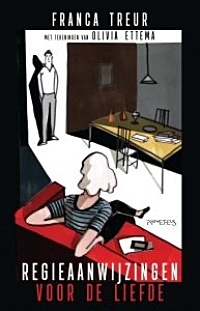 Intussen wordt het steeds benauwder in de huiskamer. Al snel gaan de ramen open en komt de buitenwereld binnen. Aan de ene kant brengt dat lucht, aan de andere kant verleiding.
Intussen wordt het steeds benauwder in de huiskamer. Al snel gaan de ramen open en komt de buitenwereld binnen. Aan de ene kant brengt dat lucht, aan de andere kant verleiding.
Bestaat de veilige cocon nog of heeft de globalisering automatisch ieders wereld groter gemaakt? Welke concessies doet een filmmaker? Hoe flexibel zijn principes? Kun je de redder in nood zijn van je ex?
In vijftig korte hoofdstukken en vijftig tekeningen wordt het moderne leven gefileerd, met bijzondere aandacht voor de liefdesrelatie. Is het moment dat de personages elkaar krijgen het moment waarop Loek en Hanna elkaar verliezen?
Franca Treur debuteerde in 2009 met de roman Dorsvloer vol confetti, waarvan meer dan 150.000 exemplaren werden verkocht. Het was het meest bejubelde literaire debuut in jaren. Het boek won verschillende prijzen en het werd verfilmd. In 2014 verscheen haar tweede roman, De woongroep, en in 2015 het Zeeuwse Boekenweekgeschenk Ik zou maar nergens op rekenen. Daarnaast schrijft ze verhalen, essays en columns voor uiteenlopende media.
Franca Treur
Regieaanwijzingen voor de liefde
Gebonden
216 p.
Druk 1
Verschenen 08-02-19
Uitgever Prometheus
Nederlandse fictie
ISBN 9789044640441
€ 19,99
# new fiction
franca treur
regieaanwijzingen voor de liefde
• fleursdumal.nl magazine
More in: - Book News, - Bookstores, Archive S-T, Art & Literature News, Franca Treur
Thank you for reading Fleurs du Mal - magazine for art & literature